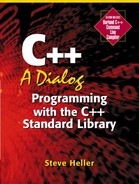Answers to Exercises
| 1. | If you got this one right, congratulations! It's just filled with tricks, but they're all things that you might run into in a real (although poorly written) program. Here's the answer:
The value of j in Calc is: 0 The value of j in main is: 12 The value of j in Calc is: 5 The value of j in main is: 23 The value of j in Calc is: 16 The value of j in main is: 40 The first question is why there are only three values displayed by each output statement. The for loop that calls the Calc routine and displays the results should execute 5 times, shouldn't it? This is the first trick. Since i is a global variable, the statement i ++; in the Calc function affects its value. Therefore, i starts out at 0 in the main function, as usual, but when the Calc function is called, i is incremented to 1. So the next time the modification expression i ++ in the for statement is executed, i is changed to 2. Now the controlled block of the for statement is executed again, with i set to 2. Again, the call to Calc results in i being incremented an extra time, to 3, so the next execution of the for loop sets i to 4. The final call to Calc increments the value of i to 5, so the for loop terminates, having executed only three times rather than the five you would expect by looking at it. Now you can see why global variables are dangerous! Now what about the values that j takes on? Well, since the j in Calc is a static variable, it is initialized only once. Because it is a local static variable, that initialization is performed when Calc is called for the first time. So the first time Calc is called, j is set to 0. The arguments specified by main on the first call to Calc are 5 and 0; this means that, inside Calc, x and y have those values, respectively. Then the new value of j is calculated by the statement j = x + y + j;, or 5 in total. The return j; statement specifies this as the return value of Calc and this value is then added to 7 as specified by the assignment statement j = Calc(i + 5, i * 2) + 7; in main. That explains why the output statement in main displays the value of j as 12 the first time. It's very important to note that the variable j in main is completely unrelated to the variable j in Calc. Since they are local variables, they have nothing in common but their names. There is no risk of confusion (at least on the compiler's part), since we can access a local variable only in the function in which it is defined. Therefore, when we refer to j in main, we mean the one defined there; and when we refer to j in Calc, we mean the one defined there. Next, we call Calc again with the arguments 7 and 4. To compute these arguments from the expressions i + 5 and i * 2, you have to remember that i has been modified by Calc and is now 2, not 1 as we would expect normally. When we get to Calc, it displays the old value of j (5), left over from the previous execution of this function. This is because j is a local static variable; thus, the initialization statement static short j = 0; is executed only once, upon the first call to the function where it is defined. Once j has been set to a value in Calc, it will retain that value even in a subsequent call to Calc; this is quite unlike a normal auto variable, which has no known value at the beginning of execution of the function where it is defined. A new value of j is now calculated as 7 + 4 + 5, or 16, and returned to main. On return from Calc, the value of j in main is 23, as set by the assignment statement j = Calc(i + 5, i * 2) + 7;. We also don't want to forget that i is now 3, having been changed in Calc. Exactly the same steps occur for the last pass through the for loop: we call Calc with the new values of i + 5 and i * 2, which are 9 and 8, respectively, since i has been incremented to 4 by the for statement's modification expression i ++. Then Calc displays the old value of j, which is 16, and calculates the new value, which is 33. This is added to the literal value 7 and stored in j in main, resulting in the value 40, which is then displayed by the output statement. Don't get discouraged if you didn't get this one, especially the effects caused by a global i. Even experienced programmers can be taken by surprise by programs that use global variables in such error-prone ways. |
